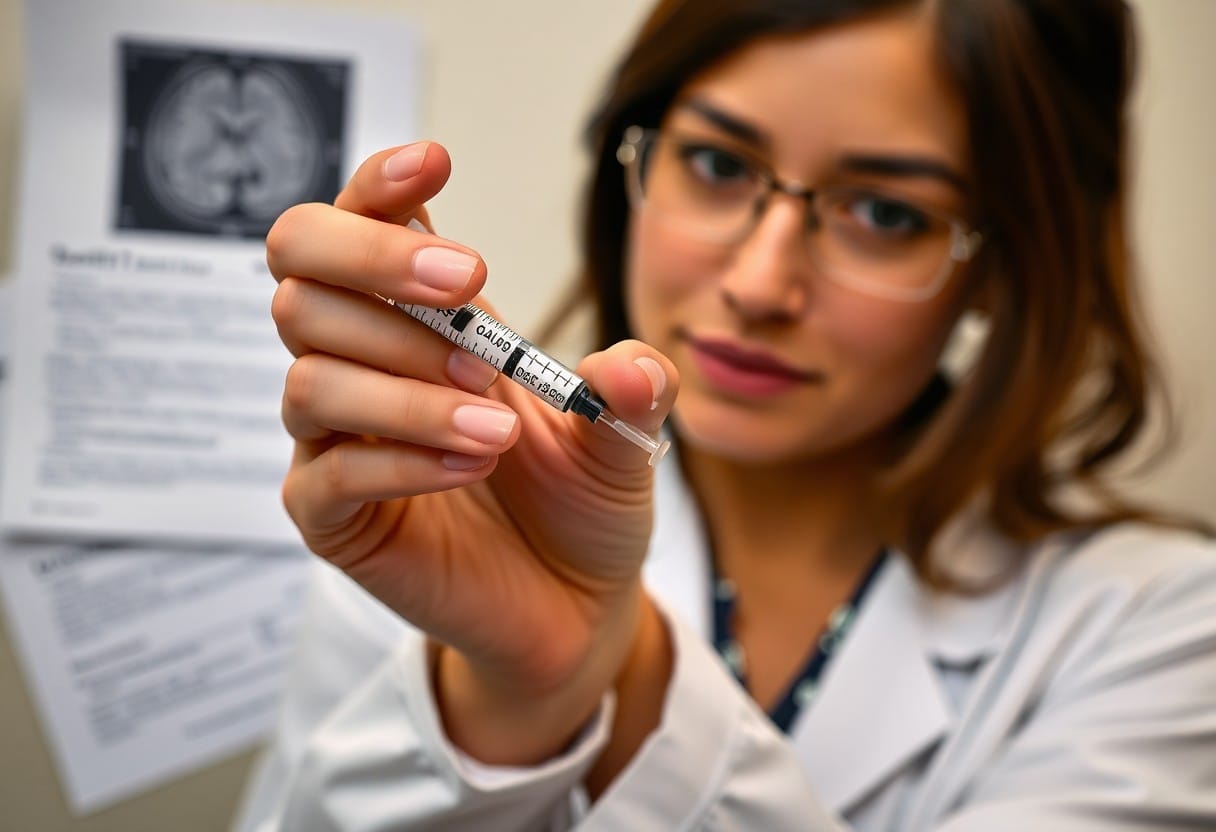Meningioma is a type of tumor that can develop in the protective layers surrounding the brain and spinal cord, and its connection to Depo-Provera, a popular contraceptive, has raised concerns. If you’re using Depo-Provera, it’s important to be aware of potential warning signs linked to meningioma, as early detection is key to managing your health. In this blog post, we will explore the symptoms you should watch for and how to approach your healthcare provider for further evaluation. Your awareness could play a significant role in safeguarding your well-being.

Understanding Depo-Provera
The Depo-Provera injection is a hormonal contraceptive method designed to prevent pregnancy and provide women with a convenient option for birth control. Typically administered every three months, it contains medroxyprogesterone acetate, a synthetic form of the hormone progesterone. You may find this method beneficial as it eliminates the need for daily pill-taking and can effectively manage your menstrual cycle.
What is Depo-Provera?
One of the most popular forms of contraception, Depo-Provera, involves receiving an injection that provides long-term pregnancy prevention. Many women appreciate its convenience, especially for those who prefer not to take a daily pill. It’s vital to consult with your healthcare provider to determine if this method aligns well with your specific health needs.
Mechanism of Action
After receiving the Depo-Provera injection, your body begins to alter its hormonal levels, primarily through the action of medroxyprogesterone acetate. This hormone works by preventing ovulation, meaning your ovaries do not release an egg each month. Additionally, it thickens the cervical mucus, making it more challenging for sperm to reach any potential egg, and alters the uterine lining to inhibit implantation.
For instance, the effectiveness of Depo-Provera is largely attributed to its ability to prevent ovulation in your body. This suppression of ovulation is significant, as it provides more than 99% effectiveness in preventing pregnancy. Additionally, by thickening the cervical mucus, it creates a barrier that poses a further challenge to sperm. Many users also experience side benefits, such as lighter menstrual periods or the absence of periods altogether, which may enhance your overall quality of life. However, it’s important to be aware of potential side effects and consult with your healthcare provider regularly to discuss your health status while using this contraceptive method.
Overview of Meningioma
Clearly, meningioma is a type of tumor that arises from the meninges, the protective membranes surrounding the brain and spinal cord. Although typically benign, these tumors can cause significant health issues depending on their location and size. Understanding meningioma is imperative, especially if you are considering treatments that may have implications for brain health.
What is Meningioma?
Meningioma is generally characterized as a slow-growing tumor that forms mainly in the meninges, which serve as a barrier between your brain and the skull. While most meningiomas are benign, they can exert pressure on brain structures, leading to various neurological challenges. You may encounter these tumors more frequently in middle-aged individuals and women.
Symptoms and Diagnosis
Between the onset of meningioma and its diagnosis, you may experience symptoms that can vary widely. Common signs include headaches, vision changes, and seizures, but the manifestation of symptoms often depends on the tumor’s location. Early detection can significantly improve your treatment outcomes.
To diagnose meningioma, your healthcare provider will perform a series of evaluations, including imaging tests like an MRI or CT scan. You should pay attention to symptoms such as persistent headaches, visual disturbances, or seizures, as these can indicate more significant issues. Even benign meningiomas can result in serious complications if not monitored or treated. A comprehensive assessment and early diagnosis allow for better management of your condition and may lead to more positive outcomes in your overall health.
The Connection Between Depo-Provera and Meningioma
Now, research has revealed a potential link between Depo-Provera, a popular contraceptive, and an increased risk of developing meningioma, a type of brain tumor. While the connection is still being studied, it’s crucial for you to be aware of the possibilities and discuss any concerns with your healthcare provider. Early detection and understanding your health can make a significant difference.
Research Findings
Any association between Depo-Provera and meningioma has emerged from various studies suggesting that prolonged use may elevate the risk. Reports indicate that women who used this contraceptive for extended periods experienced a higher incidence of this tumor compared to those who did not. It’s vital for you to understand these findings as part of your overall health strategy.
Risk Factors
With the potential connection established, several risk factors could influence your likelihood of developing meningioma while using Depo-Provera:
- Duration of use
- Age
- Family history of brain tumors
- Hormonal factors
The importance of assessing these risk factors cannot be overstated.
But understanding these risk factors can empower you in making informed choices. The duration of your Depo-Provera use, your age, and whether you have a family history of brain tumors all play significant roles as you evaluate your situation. Additionally, hormonal factors may increase the odds. Taking these points into consideration can help you engage in proactive discussions with your healthcare provider and guide you toward maintaining your health.
Warning Signs to Look For
Your health is important, and being aware of the warning signs associated with potential complications from Depo-Provera and meningioma is necessary. If you experience any unusual symptoms, such as persistent headaches, vision changes, or seizures, it is vital to consult your healthcare provider. Early detection and intervention can significantly impact your well-being.
Physical Symptoms
Against the background of your usual health, you should monitor for physical symptoms that may indicate complications. Be vigilant for persistent headaches, nausea, vomiting, or any significant changes in your balance. These symptoms can hint at issues that require immediate medical attention.
Psychological Symptoms
Signs of psychological distress can also manifest if you’re experiencing complications. Changes in mood, increased anxiety, or memory problems might occur and should not be taken lightly. If you notice these changes in yourself, it’s necessary to seek evaluation and support.
Understanding the connection between psychological symptoms and potential issues related to Depo-Provera and meningioma can help you safeguard your mental health. Emotional disturbances such as depression, heightened anxiety, or cognitive difficulties may indicate underlying problems that warrant further investigation. If you find these symptoms are impacting your daily life, consider discussing them with a healthcare professional to explore possible causes and treatments.
Consultation with Healthcare Providers
Once again, it is imperative to consult your healthcare provider when considering the use of Depo-Provera, especially if you have concerns regarding meningioma. Discuss any pre-existing health conditions and personal or family history of brain tumors to ensure you are making an informed choice. Your provider can help you weigh the benefits and potential risks of this contraceptive method against your unique circumstances, guiding you to the safest option for your health.
Importance of Monitoring
Beside discussing your concerns about meningioma, regular monitoring of your health is vital while on Depo-Provera. Stay vigilant for any new symptoms or changes, and make sure to follow up with your healthcare provider for routine check-ups. Early detection and intervention are key factors in managing any potential health issues that may arise during use.
Questions to Ask
One of the best strategies to ensure your health is protected is to prepare a list of questions for your healthcare provider. Inquire about the risks associated with Depo-Provera, the signs and symptoms of meningioma, and any necessary follow-up procedures to monitor your health.
Consultation is an opportunity for you to become well-informed. Make sure to ask about specific risks linked to Depo-Provera and its connection to meningioma. You can also inquire about screening recommendations and any early warning signs of potential complications. Engage in open dialogue, as your healthcare provider can offer valuable insights that will empower you to make informed decisions regarding your reproductive health and overall well-being.
Treatment Options for Meningioma
Unlike many other conditions, the treatment options for meningioma depend on various factors, including the tumor’s size, location, and your overall health. Potential approaches include surgical intervention, radiation therapy, and monitoring. Each option aims to reduce symptoms and improve your quality of life, highlighting the necessity for personalized treatment plans tailored to your specific circumstances.
Medical Interventions
Above all, medical interventions for meningioma often begin with surgery, which can be effective in removing the tumor. In cases where surgery is not viable, radiation therapy may be suggested to target remaining tumor cells. Regular follow-ups are crucial to monitor your health and determine the effectiveness of the chosen intervention.
Lifestyle Considerations
With a meningioma diagnosis, your lifestyle choices can play a significant role in your overall well-being. Maintaining a balanced diet, engaging in regular physical activity, and managing stress are all important aspects of your recovery and long-term health.
Considerations such as nutrition, exercise, and stress management can positively impact your health during and after treatment. A well-rounded diet rich in fruits, vegetables, and whole grains supports your body’s healing processes. Regular physical activity not only improves physical health but also enhances your mental well-being. Lastly, incorporating relaxation techniques like meditation or yoga can help reduce stress levels, allowing you to cope better with challenges associated with meningioma. By focusing on these areas, you can create a supportive environment for your recovery.
To wrap up
Taking this into account, it is necessary for you to be aware of the potential association between Depo-Provera and meningioma. Symptoms such as persistent headaches, visual disturbances, or changes in cognitive function should prompt you to consult your healthcare provider. Staying informed about any risks associated with hormonal contraceptives can empower you to make the best decisions for your health. Regular check-ups and open communication with your clinician can help you monitor your well-being effectively.

















